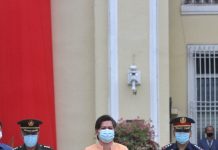This, in a nutshell, is the sentiment of the beneficiaries of the conditional cash transfer (CCT) anti-poverty program of the government, according to a study by the non-government Social Watch.
“Our study reveals that most of the beneficiaries it surveyed expressed gratitude that with the cash grants, the health and education status of their families were improving. Nevertheless, an overwhelming majority of beneficiaries said that what would lift them out of poverty was access to regular employment,” the group said in a paper released during a forum last week discussing the economic agenda of the Aquino administration.
The group, whose members openly supported the candidacy of Pres. Noynoy Aquino in last elections, calls on the government to come up with comprehensive anti-poverty initiatives that are not “short-term palliatives.”
Started by Arroyo
Launched in late 2007 by the Arroyo administration, the Philippine government’s version of CCT addresses issues on maternal and child mortality through the provision of vaccines and cash, as well as keep children in school for five years.
Under the CCT program, the government through the department of social welfare and development (DSWD), will directly provide a monthly stipend of P1,400 to poor families with kids ages 14 years and below on the condition that parents send their children to school and mothers get regular prenatal or postnatal care. The program runs for five years for household-beneficiaries.
Other vulnerable groups, like poor senior citizens, the chronically sick, people with disabilities, the millions of out-of-school, and functionally illiterate or the unemployed poor, are not covered by the program.
To increase
Pres. Aquino seeks to expand the coverage of the program with the allocation of P21 billion in the 2011 budget from the current P14 billion. With the help of a $400-million loan from the Asian Development Bank (ADB) approved in September, the number of beneficiaries is expected to reach 2.3 million by next year and 4.6 million families by 2016.
On top of the CCT, the DSWD will implement a P4.2 billion rice subsidy program and a P2.8 billion feeding program.
But Social Watch said that providing cash assistance to poor families will not solve their poverty situation, especially after their program coverage expired, not unless they are given an opportunity for gainful employment.
“One of the most important elements in the fight against poverty is productive employment, an important component of MDG 1 (eradicate extreme poverty and hunger). In this light, (we) call on the government to put quality job creation (which includes green jobs’) and the protection of workers’ rights, including women’s rights, in the forefront of its anti-poverty agenda.”
The group argues that success of the program—which addresses the demand side, through the provision of cash grants—requires ensuring the supply side, like the availability of health, education and transport facilities and services.
“But the fact that public investment in education and health is low and has generally declined between 2000 and 2006 at both the national and local government levels, does not augur well for the 4Ps meeting its stated objectives. This means that public investment in education and health must significantly increase. Stress is made on ensuring the quality of services,” it added.
Dr. Rene Onofreo, a professor at the UP School of Labor and Industrial Relation (UP SOLAIR) who also graced the forum, recommends that the government expand the CCT into a work-based cash transfer like the guaranteed job schemes adopted in some Indian states.
“Is it not better to promote jobs for the poor through varied community renewal programs for the climate change, labor-intensive infrastructure development and ecosystem restoration activities?” he asked.
May not work
As the original implementor, the Arroyo administration patterned the CCT program to similar programs adopted by other governments, especially in Latin America.
But the Social Watch pointed out that what works in other countries may not necessarily work here.
“Context matters. While conditional cash transfers (CCTs) around the world share similarities, features vary across countries, and more importantly, the economic and social policy settings in which these CCTs are embedded in, also vary,” the group pointed out.
It cited for example Mexicos’ Oportunidades, which apart from education and health cash grants, are accompanied by cash transfers for food and for the elderly while in Brazil, Bolsa Familia is part of a larger economic and social protection scheme composed of ‘complementary actions’ and services to poor families. Among the significant ‘complementary actions’ are employment creation, provision of income generating activities, and improvement of housing conditions.
Pres. Aquino has earlier recognized that the CCTs as a ‘stand alone’ program will not work and his administration has taken steps to link it with other economic programs like theKalahi-CIDDS and Self Employment Assistance-Kaunlaran or SEA-K.
Social Watch, however, said the group still believes that there is a need to refine such a strategy.
“For one, the highly micro-ized and project-ized nature of Kalahi-CIDDS projects has generated, at best, localized impact on poverty reduction and has not made a dent on reducing over-all poverty. Second, data has shown that SEA-K activities revolve mostly around low-value trade and commercial activities with limited impact on poverty reduction as well.”






